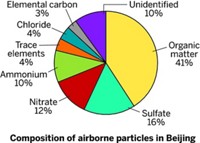Advertisement
Grab your lab coat. Let's get started
Welcome!
Welcome!
Create an account below to get 6 C&EN articles per month, receive newsletters and more - all free.
It seems this is your first time logging in online. Please enter the following information to continue.
As an ACS member you automatically get access to this site. All we need is few more details to create your reading experience.
Not you? Sign in with a different account.
Not you? Sign in with a different account.
ERROR 1
ERROR 1
ERROR 2
ERROR 2
ERROR 2
ERROR 2
ERROR 2
Password and Confirm password must match.
If you have an ACS member number, please enter it here so we can link this account to your membership. (optional)
ERROR 2
ACS values your privacy. By submitting your information, you are gaining access to C&EN and subscribing to our weekly newsletter. We use the information you provide to make your reading experience better, and we will never sell your data to third party members.
Environment
Greening China's Indoor Fuel Use
Climate Change: Biogas generators could reduce greenhouse emissions in rural China
by Sara Peach
March 7, 2011

About 700 million people live in China's rural provinces, where they traditionally burn coal, wood, and crop waste for fuel. But if those people switched to a fuel produced from animal waste, they would significantly reduce greenhouse gas emissions, according to a new study by an international team of researchers (Environ. Sci. Technol., DOI: 10.1021/es103142y).
Burning traditional fuels indoors produces harmful smoke and contributes to an estimated 420,000 premature deaths each year in China, according to the World Health Organization. In response, the Chinese government has subsidized the installation of more than 10 million clean-burning fuel generators in the past decade.
The fuel generators, called anaerobic digesters, rely on microbes that break down animal or human waste inside airtight, underground tanks that are typically between 6 and 10 m3 in size. They produce biogas, which is composed largely of methane. The biogas travels through pipes into the home, where people burn it for cooking, lighting, and heating.
Switching to biogas greatly reduces indoor air pollution, and burning the gas produces less greenhouse emissions than coal or wood do. But scientists worried that methane could leak from the digester systems into the atmosphere, says Justin Remais, an assistant professor of environmental health at Emory University. Because methane is a potent greenhouse gas, even moderate leaks could worsen climate change.
To assess the systems' overall contribution to climate change, Remais' team visited six villages in Sichuan Province. They interviewed representatives of 67 households about their family's energy use: Thirty-five of the families burned traditional fuels for household needs, and the remaining 32 households used biogas from anaerobic digesters. The researchers then scanned for methane leaks using tunable diode laser absorption spectroscopy. Using the leak data and the results of the questionnaires, the researchers calculated how much global warming would be produced by gases emitted during burning traditional fuels or biogas.
They found that compared with traditional fuels, anaerobic digesters would produce as much as 54% less warming over 20 years. The researchers detected methane leaks in less than 10% of digesters, but they calculated that even leaky systems would cut warming compared to traditional fuels, by 35 to 42% during the same period.
The study is the first to demonstrate that in addition to improving public health, using anaerobic digesters could benefit the climate, says Kirk Smith, a professor of global environmental health at the University of California, Berkeley. "That's a significant contribution," he says.





Join the conversation
Contact the reporter
Submit a Letter to the Editor for publication
Engage with us on Twitter